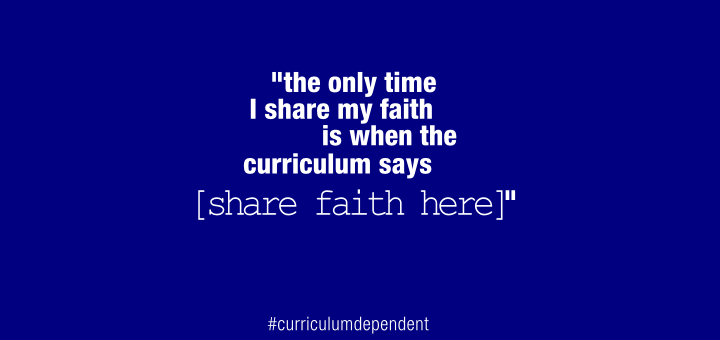On Sunday morning, my friend stood up in front of our congregation to share a brief testimony. It was an introduction to a sermon on being salt and light. What he said blew my mind.
“When I was in high school, I shared my faith. When I was in college, I shared my faith. But I realized that—now that I’m an adult—the only time I share my faith is when the curriculum says [share faith here].”
It’s certainly not the end of the story, though. He is committed, perhaps more than anyone I know, to bringing the light of the Gospel to every part of his life and community.
But I have to admit: it sure hit home with me. Having been in “professional ministry” now for fifteen years, I find the same thing has been happening to me. I am becoming curriculum-dependent.
Devotions are replaced with sermon-writing.
Prayer is replaced with preparation.
Friendship is replaced with counseling.
And sharing the Good News about Jesus Christ has become just another section in the curriculum.
Sunday morning worship is work time. On the clock. Doing ministry.
But you and I, we were not called to ministry in that sense. We were not inspired by the excellent execution of fantastically written curriculums. We were not motivated by an appointment with a pastoral counselor. We did not suffer through Biblical Hermeneutics and Systematic Theology classes so that we could walk onto a stage once or twice a week and tell people what to believe.
No, we were inspired by sacrifice. We were motivated by someone who invested in us. And we studied so that we could walk shoulder-to-shoulder with others in their difficult journey to understanding and faith.
And, so, I believe it’s time to quit… cold turkey. It’s time to give up our dependence on the curriculum, the program, and the platform. Because ministry is so much more than that.
The ministry you were called to doesn’t happen in one hour on one day a week. It doesn’t happen in the office or the pew on Sunday morning. It doesn’t happen in the careful recitation of a finely tuned curriculum.
It happens when you look your neighbor in the eye and smile. It happens when you listen to a hurting friend. When you share a meal. When you engage your community. When you take a deep breath, and even though there’s no curriculum, you share the story of your faith in God.

I think the flip side is also true. I know far too many pastors who “write their own stuff” to the point that they are avoiding people under the guise of writing everything.
Totally agree, Adam. I guess I’m not suggesting we don’t use curriculum… great curriculums do free us up for ministry.